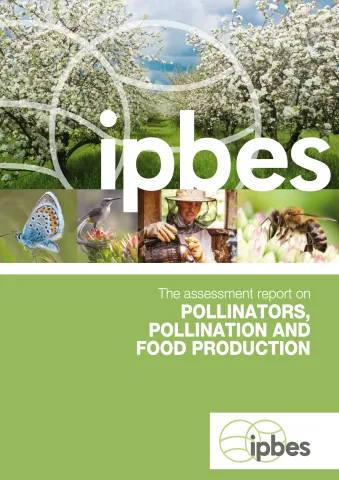Assessment Report on Pollinators, Pollination and Food Production

This Assessment covers changes in animal pollination as a regulating ecosystem service that underpins food production and its contribution to gene flows and restoration of ecosystems. It addresses the role of native and exotic pollinators, the status of and trends in pollinators and pollination networks and services, drivers of change, impacts on human well-being, food production of pollination declines and deficits and the effectiveness of responses to pollination declines and deficits. The Assessment informs enhanced policy responses to declines and deficits in pollination by identifying policy-relevant findings for decision-making in government, the private sector and civil society, as well as helping to demonstrate how an essential ecosystem service contributes to the 2030 Agenda for Sustainable Development.
The Plenary approved the Summary for Policymakers and accepted the chapters of the Assessment at its 4th session in February 2016 in Kuala Lumpur, Malaysia (IPBES 4). As the first of the completed IPBES thematic outputs, the publication of this Assessment has generated a wide range of follow-up products, actions and policy initiatives. Some of the most noteworthy of these are:
- A formal endorsement of the key messages of the Assessment by the Conference of the Parties to the Convention on Biological Diversity at its 13th meeting (COP13).
- The formation of a “Coalition of the Willing” by a growing number of Governments around the world, inspired by the assessment to act nationally to protect pollinators and to promote pollination.
- The publication, in both the Nature and Science journals, of major articles building on and reviewing the assessment. Access the media releases at https://goo.gl/xVHMKR and https://goo.gl/CvUYB2
- An ever-expanding list of national strategies and action plans on pollination, premised on the outcomes of the assessment, in countries including, among others: France, the Netherlands, Brazil, South Africa and the Republic of Korea.
IPBES would like to acknowledge and thank all of the experts who contributed to the Assessment, and whose efforts have already made so great an impact in strengthening the science-policy interface on pollination.
Editors: Simon G. Potts, Vera Imperatriz-Fonseca, Hien T. Ngo
Members of the management committee who provided guidance for the production of this assessment: A. Báldi, A. Bartuska (Multidisciplinary Expert Panel); I. A. Baste, A. Oteng-Yeboah, R. T. Watson (Bureau).
Suggested citation: IPBES (2016). The assessment report of the Intergovernmental Science-Policy Platform on Biodiversity and Ecosystem Services on pollinators, pollination and food production. S.G. Potts, V. L. Imperatriz-Fonseca, and H. T. Ngo (eds). Secretariat of the Intergovernmental Science-Policy Platform on Biodiversity and Ecosystem Services, Bonn, Germany. 552 pages. https://doi.org/10.5281/zenodo.3402856